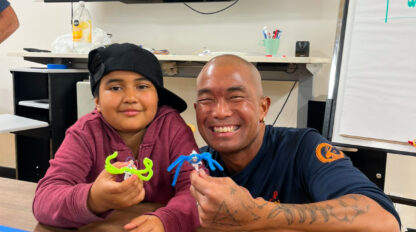Sharing Her Voice: Keanna Vicente

Keanna Vicente is in her second year with our Y’s Youth & Government Program. She has faith in the democratic process and believes change is made from people speaking up and taking action on issues that are important to them.
Last week Keanna asked her fellow delegates to hear her speak about a topic that is close to her heart. She shared an essay she had written called “Grammatical Gender.” As a Y&G Delegate, Keanna knows that there are always multiple sides to an argument and respects opposing views. She presented her work during delegation meeting to have her voice be heard, spark new ideas, and receive feedback on her statements.
“Being in Youth & Government allows me to learn through our different opinions and different ways of expressing ourselves. Their opinions [delegates] and preferences helped me form a few of my own.”
Grammatical Gender
By Keanna Vicente
High School Sophomore and 2nd year Y&G Delegate
Parents tend to try to raise their children based on gender stereotypes, from the time they are in the womb, and some even try to do it when the kid is a full grown adult. But how do they necessarily know what is feminine and what is masculine? Femininity is defined as “The quality of being female; womanliness,” which isn’t exactly a centennial approved definition, and maybe that point is also clouding my judgment. But raised in a household where I was constantly put into princess costumes, bought dolls, plastic cooking toys, and taught that having the anatomy of a female, I would be treated as a Girl.
My mother, who raised three children mostly on her own, is that kind of parent who chooses all the pink clothes once the gender of her baby was told to her. Pink tends to be a color associated with feminine things, and being a little baby in her belly, I had no say in what I was going to be dressed in for the next few years of my life. Don’t get me wrong, she raised three amazing children, my statement not being biased, but now having a mind of my own, I just don’t appreciate the boundaries I was given as a child.
“Don’t play with your boy cousins, they’re too rough.”
“The pink one or the purple one.”
“Do you want a new doll?”
Assuming yes, I’d like that new doll, purple shirt or actually wanted to get away from my cousins who were messing around, would it make me a bad feminist? Conforming to the stereotypes that all little girls like dolls, or the purple, or can’t handle a little horsing around? No, I’m not a bad feminist or person, I was taught to do these certain things. Placed into a bubble where I thought, “Maybe I shouldn’t get those nerf guns, I’m not a boy.” My parents would take me to the Girl section at target, which still exists, meaning many parents are still raising kids like this. I respect that, raise your kids, dress her in a skirt and him in pants. But why create a boundary where you have the need to support grammatical gender? The skirt is feminine, and the pants are masculine, what more could there be?
The idea of grammatical gender is that it’s a system of noun classification, and masculine and feminine are used as the categories, like using men as a masculine word. We are all raised to say she for a girl and he for a boy, but we are also taught to “not judge a book by it’s cover,” which is ironic seeing as we naturally call a women who looks, like a women, a “She”.
As of lately, I’ve tried to share my theory on this whole thing, which is that there is no feminine nor are there masculine traits. Femininity for one shouldn’t be the definition of a woman and her “womanliness,” a woman or little girl shouldn’t be defined for her taste in purple shirts, or dolls, or nerf guns. She should be able to announce her presence in this world the right way, her own way, and seeing as parents are still conforming to this whole idea of feminine and masculine way of raising their children, I say we should step up and create a new way of living. The way where every child isn’t seen for his or her, or their gender, they are seen for the being who they are.
Thank you, Keanna!


